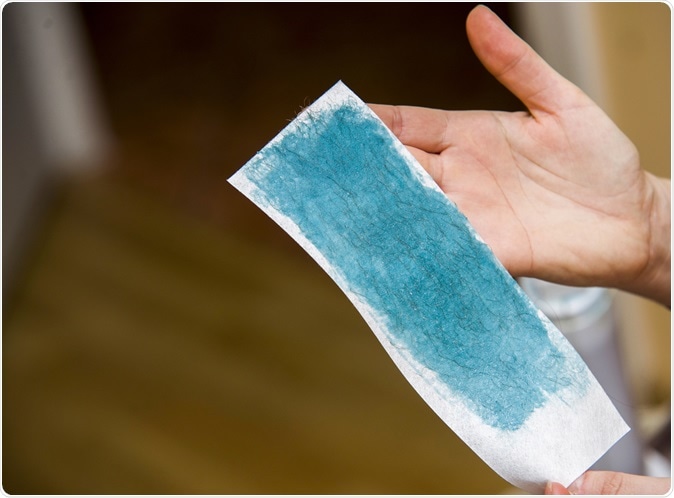A new study has shown that over a quarter of those who shave, wax or use laser hair removal for grooming pubic hair might be in for some form of mishap during the process. For the study the researchers placed questionnaires to participants regarding their approach to pubic hair grooming.

Used Wax Strip. Image Credit: By Trybex / Shutterstock
They found that at least three in four individuals removed some or all their pubic hair regularly. Further 26 percent of those quizzed revealed that they have had at least one injury during the process of pubic hair grooming. These could be cuts, rashes or burns write researchers.
The study was published yesterday in the journal JAMA Dermatology.
The study was initiated when the researchers looked at the common problems involving the genitalia that presented in the emergency rooms. Benjamin Breyer, a urologist at the University of California, San Francisco and co-author of the study said what surprised them was the frequency with which people turned up with “injuries relating to grooming”. At least 3 percent of all adults in the emergency presented with a “grooming injury” to the genitourinary system he explained. And this was a high incidence that prompted this study for a more in depth look.
For this study the team of researchers looked at US-based adults aged 18-64 all over the country in an online survey. The survey was carried out in January 2014. Participants were asked to report anonymously about the age they started grooming pubic hair, how hairy they thought themselves to be and the types and frequency of injuries they sustained during their efforts at grooming. All in all 7,456 adults took part in the survey.
Results showed that 5,674 participants reported that they had, at some point, groomed their pubic hair. According to gender, 67% of men and just over 85% of women admitted to grooming their pubic hair at some point in their lives. Of these most resorted to self when it came to pubic hair removal with just under 4 percent using a professional’s help in pubic hair removal. Another 9 percent used a partner’s help and 0.5 percent of the respondents used a friend’s help for pubic hair removal. Nearly three-quarters of participants admitted to using some form of razor to shave off their pubic hair.
Men who thought they were hairier tended to get hurt more often while shaving themselves down there. Results showed that 27 percent of women and almost 24 percent of men cut themselves while shaving and 1.4 percent needed medical attention for their injuries. Among men the commonest sites of injuries were over the scrotum (67. 2 percent) and penis (34.8 percent) while in women the pubis (51.3 percent) was the commonest site of injury followed by inner thigh (44.9%), vagina (42.5%), and perineum (13.2%).
One of the most common injuries was cuts or lacerations that made up for 61.2 percent of all the grooming related injuries wrote the study authors. A further 23 percent of the reported injuries were due to burns that could be caused by waxing. Rashes caused 12.2 percent of all injuries. Of those who responded with a yes to have been injured at some point of time during pubic hair removal, two-thirds reported that they had been hurt more than once and one third reported to have sustained such injuries on five or more occasions.
Beyer noted that those who went for complete hair removal were those who were more likely to be injured. For example, women who removed all their pubic hair were 11 times or more likelihood of injuries. This is self-explanatory he said, since persons who would remove hair from all the “nooks and crannies” were more likely to get injured during the process. He added that most of the injuries reported were minor with only 2.5% of the injuries being severe requiring surgical interventions such as stitches or drainage of abscesses caused due to infections.
Beyer said that razors are the most popular devices people used and also the most injury-causing ones. Electric razors on the other hand are less likely to cause injury but also less likely to give a close shave.